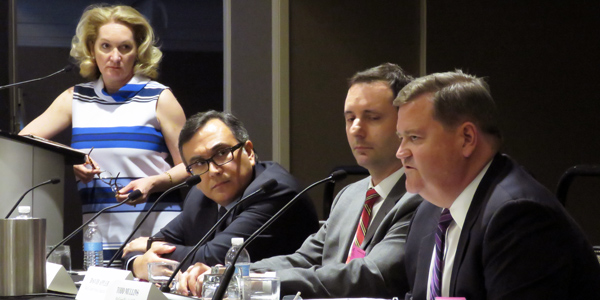By Rich Heidorn Jr.
WASHINGTON — It’s been 10 years since FERC revised its enforcement policy guidelines, and former commission attorneys David A. Applebaum and Todd Mullins think it might be time for a check-up.
“In many cases, penalties are just too high,” said Applebaum, a former director of the Division of Investigations in FERC’s Office of Enforcement, during a panel discussion at the Energy Bar Association’s annual meeting last week.
He said that while companies face treble damages for federal antitrust violations, some FERC penalties are five to 10 times the amount of the unjust profits.
Mullins, chair of McGuireWoods’ energy enforcement practice and a former branch chief in the Division of Investigations, agreed a review of the guidelines “might be timely.”
NAV Policy
Mullins was more emphatic about the commission’s policy on issuing staff Notice of Alleged Violations (NAVs). “There’s a pretty broad consensus that the NAV is not providing benefits,” he said. “I just think it’s time to get rid of it.”
Introduced in 2009, the policy allows FERC’s Enforcement director to make a public disclosure of its enforcement investigations — including the identities of investigation subjects — once the subject has had the opportunity to respond to staff’s preliminary findings. The NAV comes before staff finalizes its conclusions and the commission issues an order.
Previously, investigations were secret until the commission issued an order approving a settlement or began an enforcement action with an Order to Show Cause. The commission acknowledged that public notices could harm the reputations of subjects but said the change was justified because it would allow third-party market participants to bring relevant information to FERC’s attention and educate them about the nature of the alleged violations.
Applebaum, now a partner at Akin Gump, coauthored a 2017 article in the George Washington University Journal of Energy & Environmental Law calling on FERC to rescind the NAV policy.
Identifying Individuals
The article contended the policy has not produced the benefits that the commission anticipated and that the commission’s enforcement efforts are increasingly targeting individuals in addition to their companies.
Martin Ramirez, compliance counsel for Freepoint Commodities and another former FERC Enforcement attorney, said the policy does have a deterrent effect.
“There’s nothing that wakes up people in the middle of a [compliance] training than going over some of the individuals who have been affected by that policy,” he said. “Nobody wants to be the guy whose perp walked out of their place of business.”
Mullins said the disclosures can be devastating.
“When the NAV comes out — which is a one-line [summary] — and names the individual and says, ‘The staff has preliminarily determined,’ if that person works for a public company, they’re toast,” he said.
Having won court approval for pursuing individuals, the commission is unlikely to reverse the policy, Mullins said. But he said it could formalize the process and explain which individuals will be named. “There’s obviously a lot of human beings surrounding the activity. Where do you draw the line between someone who was just really peripheral and you’re not including them versus someone who you are including?” he asked. “Or are you including people just because of management responsibilities?”
Mullins noted former Commissioner Tony Clark’s dissent from the commission’s 2015 order that fined Maxim Power $5 million and employee Kyle Mitton $50,000 for overcharging ISO-NE in a fuel-switching scheme. Clark said Enforcement did not prove the case to his satisfaction and that he had doubts about Mitton’s culpability. “Even in the event that I had found that Enforcement staff had met its overall burden in the case, I could not support holding only the front-line employee culpable when management itself embraces and takes ownership of the actions,” he wrote. (See FERC Fines Maxim Power $5M in Switching Scheme.)
De Novo Reviews
The panel, which was moderated by Skadden Arps attorney Donna M. Byrne, also discussed six recent federal court rulings that said defendants in civil penalty cases are entitled to a de novo trial rather than a more limited appellate-style review of FERC’s evidence. (See FERC Loses Again on ‘De Novo’ Review.)
Applebaum questioned whether FERC will want to continue its current practice of issuing orders assessing penalties.
“If the courts are essentially saying that the order assessing penalties is really of no moment — what really matters is just the complaint that’s going to be filed — does the commission want to spend all of that time working on an order that may not be necessary?
“And so, the commission may well find itself in the position of saying ‘Let’s truncate — or potentially get rid of — the order-assessing-penalties process if that means getting to federal court more quickly.
“Certainly, among defendants, among market participants — I think a lot of people in the Enforcement staff — would be happy if we could get to federal court more quickly. But there’s a legal issue that the commission is going to have to face: Does the FPA allow the commission to get rid of this more involved order-assessing-penalties process? There’s a difference of opinion on that.”




